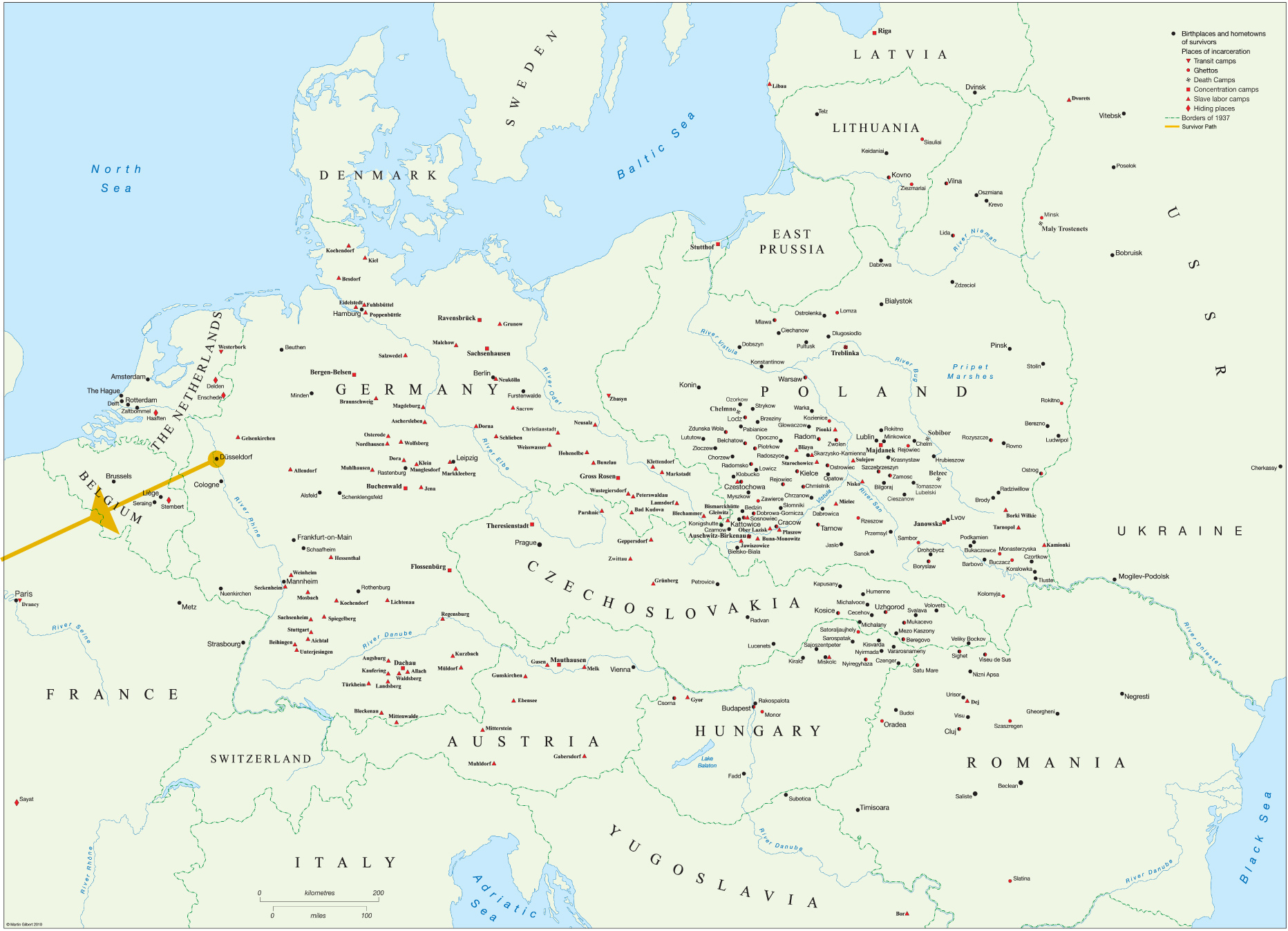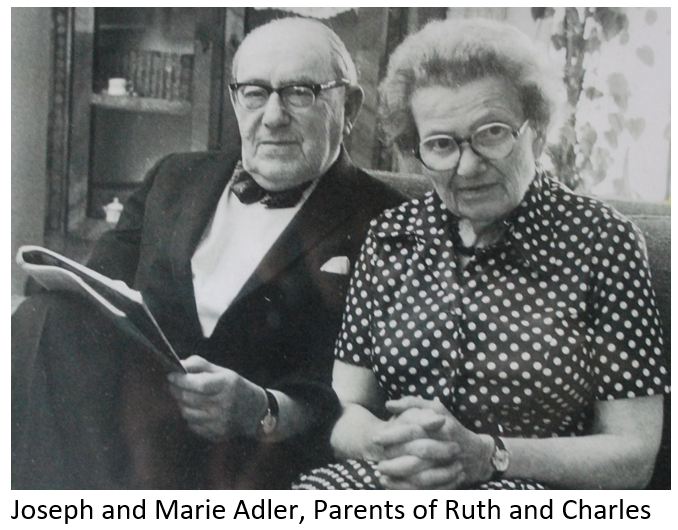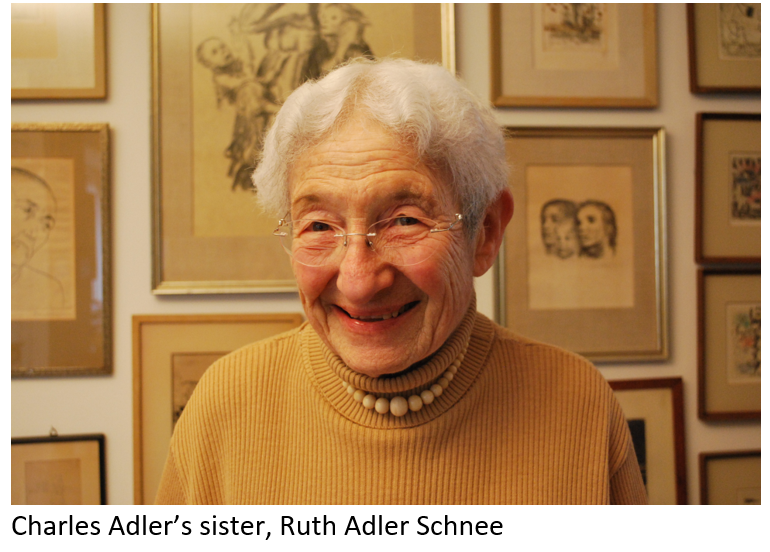Charles Adler
"Behave! Behave and keep things straight. Take it all in stride, make sure that you don't go overboard."
Name at birth
Karl Heinz Adler
Date of birth
07/03/1926
Where were you born?
Where did you grow up?
Dusseldorf, Germany
Name of father, occupation
Joseph Adler,
Salesperson, representative; earlier he was in real estate
Maiden name of mother, occupation
Marie Salomon,
A mother!
Immediate family (names, birth order)
Parents and two children: Ruth Adler (born 1923, see photo) and me
How many in entire extended family?
About 20. We moved to Dusseldorf when I was around three years old.
Who survived the Holocaust?
My parents, my sister, and I and some other relatives
It was a comparatively easy life in Dusseldorf, even when Hitler came around when I was ten years old. I still had many non-Jewish friends. I went to a public school; I mixed in with everybody. There were no commotions about my being Jewish.
Once Nazis assumed power, everything changed for the worst. We were afraid to go outside. Nazi headquarters were across the street from our apartment. I remember January 31, 1933, how scary it was when Hitler came to power, how the Nazis celebrated. I was seven years old.
In the early part of 1938, when I was eleven years old, I was kicked out of school by the authorities of the school. My friends were told not to be friends with me.
I remember three incidents that stand out in which I was very lucky.
The first occurred when I was taking our dog, Mookie, out. Our dog did not like high boots. So here comes an SS officer with highly polished boots. Mookie started getting wild and scratched the living daylights out of those boots.
I picked her up to get her away from the boots. I started to apologize to this officer. He said, don’t worry, I have a Dachshund also and I know how they act. Go on home and goodbye.
It was unbelievable. I could have been arrested; I was lucky.
The second occurred when the SS picked my dad to take him to the concentration camp. The SS man walked out of our apartment with my father. The way our apartment was laid out, the SS couldn’t see my room. I was twelve years old; I would have been taken away.
The third incident also occurred at the time of Kristallnacht, at the end of 1938. It was not safe for us to stay in our own apartment.
Julie Juchach (pronounced Yu-chatch), a non-Jewish woman who was a friend of our family, took my sister and me into her apartment. She was going to hide us but there was a problem, her son belonged to the SA.
The son would lose his mother if he reported her, but he called the Gestapo and told them what his mother was doing. Fortunately, when he made the phone call, the garage operator could hear everything he said. He called us up immediately and so we arranged to go out the back door. Just as we went out the back door, the Gestapo came in through the front door.
Unfortunately, Julie was arrested and sent away. We received one letter from her and then no more. Julie Juchach saved our lives but paid for it with her own life.
We went back to our apartment. A few days left; we took the train to a port in France. It was in the latter part of February when we left France for New York.
After Kristallnacht, they took my father to Dachau. If you could get yourself a visa to get out within a certain period, you could leave Germany. My parents were working on this visa when my dad was arrested.
On the night of Kristallnacht, we didn’t go out at night; dad had a feeling something bad was going to happen.
Kristallnacht occurred in downtown Dusseldorf. A number of stores were destroyed. We were far away from downtown; our address was 69 Wilhelm Strasse. We saw the results of Kristallnacht the next day.
My mother put pressure on the American embassy for help to get a visa. My mother called every morning and pushed to get a visa. If she had not done this, then nothing would have happened.
We finally got our visa a couple of days before my dad’s deadline to get out.
My dad was in the real estate business. It’s interesting, quite a few of his customers were Nazis who wanted him to manage their buildings.
We left Germany, the latter part of January or early February. It was hard leaving my friends behind. I was twelve years old when we left Germany.
A number of relatives went to England but quite a number stayed behind. They couldn’t get out, or they didn’t want to get out as they felt they had had a good life in Germany.
A few others left the country and went to England. They left at a much earlier time.
The Germans could tell who was Jewish by our facial differences. It became nothing to get yelled at,” Jew! Jew get out of here!”
We went by ship to America, the Aquetania. I remember going by the Statue of Liberty. It takes you, that statue. I’ve always wanted to go back there and get inside the statue. It represents so much, it means freedom, new life.
My dad borrowed money from a Jewish organization. Then we came to Detroit because my cousin and my mother’s sister were also living here. This was March 1939.
My dad got a job working for a florist. He spoke German, which is like Yiddish. The owner was Yiddish speaking. I was told you had better learn English!
My mother built a business, manufacturing lampshades.
After I finished high school, I was drafted into the United States Army.
I was stationed in a camp in Kansas and then later in Puerto Rico. I offered my services as I was fluent in German to help the war front, but I was turned down.
After the war, I went to college in Detroit and later in Ann Arbor, Michigan.
Occupation after the war
Sales, customized bags
When and where were you married?
We were married in 1946
Spouse
Myra Horowitz
Children
Two children, David and Jan, both deceased
Grandchildren
Marc Jacobs
What do you think helped you to survive?
The fact of having good people around me, like Julie Juchach You had no choice, you had to keep going.
What message would you like to leave for future generations?
Behave! Behave and keep things straight. Take it all in stride, make sure that you don't go overboard.
Interviewer:
Charles Silow
Interview date:
10/07/2013
Experiences
Survivor's map


